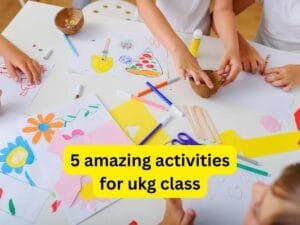UKG Class and Importance of Activities
UKG (Upper Kindergarten) class refers to the educational level that typically accommodates children between the ages of 4 to 5 years old.
This phase plays a pivotal role in laying the foundation for a child’s future academic journey and overall development.
It focuses on developing holistic development, encompassing cognitive, social, emotional, and physical growth.

Significance of Activities in UKG Class
Activities in UKG class are crucial for enhancing various skills and abilities in children.
Activities play a vital role in promoting cognitive development by stimulating problem-solving skills and critical thinking.
Moreover, they aid in developing social skills through collaboration, emotional skills through self-expression, and physical skills through movement and coordination.
Engaging activities also facilitate creativity, innovation, and exploration, leading to a well-rounded development in young learners.
5 Amazing Activities for UKG Class
1. Arts and Crafts
Creative learning activities for UKG class
Arts and crafts are essential for fostering creativity and fine motor skills in UKG students.
Simple art projects like finger painting, paper crafts, and collage making are enjoyable and educational.
2. Storytelling and Dramatics
Engaging activities for Upper Kindergarten students
Storytelling and dramatics enhance language skills, imagination, and confidence in young learners.
Interactive storytelling sessions, role-playing activities, and puppet shows are interactive options for UKG students..
3. Music and Movement
Educational play for 4-5 year olds
Music and movement activities aid in developing coordination, rhythm, and self-expression in UKG students.
Dance sessions, music exploration, and rhythm games engage children in a fun and educational manner.
4. Science Experiments
Developmentally appropriate activities for UKG children
Hands-on science experiments cultivate curiosity and critical thinking skills in young learners.
Simple experiments like color mixing, weather observations, and plant growth experiments are suitable for UKG students.
5. Outdoor Nature Exploration
Interactive learning experiences for kindergarten students
Outdoor nature exploration promotes sensory experiences, environmental awareness, and physical fitness.
Activities such as nature walks, gardening projects, and outdoor scavenger hunts connect UKG students with the natural world.
FAQs for 5 Amazing Activities for UKG Class:
Why are arts and crafts important for UKG students?
Arts and crafts activities are essential for UKG students as they enhance creativity, fine motor skills, and cognitive development. These activities also encourage self-expression and imagination in young learners.
How can storytelling benefit UKG children?
Storytelling can help improve language skills, spark creativity, and boost confidence in UKG students. Engaging in dramatic activities promotes social interaction and enhances communication skills.
What are the benefits of music and movement activities for UKG students?
Music and movement activities aid in developing coordination, rhythm, and self-expression in UKG students. These activities also promote emotional well-being and physical development.
Why are science experiments recommended for UKG students?
A: Science experiments help cultivate curiosity, critical thinking skills, and a scientific mindset in UKG students. Hands-on experiments enable children to explore the world around them in a fun and engaging manner.
How does outdoor nature exploration contribute to the development of UKG students?
Outdoor nature exploration offers UKG students sensory experiences, promotes environmental awareness, and encourages physical fitness. Engaging with nature enhances observation skills and fosters a deep appreciation for the natural world.
Conclusion:
Incorporating a variety of engaging activities such as arts and crafts, storytelling, music and movement, science experiments, and outdoor nature exploration in the UKG curriculum plays a pivotal role in fostering holistic development and academic progress in young learners. By providing interactive and hands-on learning experiences, educators can enhance cognitive, social, emotional, and physical skills in UKG students, laying a strong foundation for their future academic success and overall well-being.



